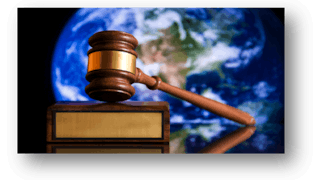Internationales Recht in Aktion erklärt die Funktionen der einzelnen internationalen Gerichtshöfe und Tribunale in Den Haag und zeigt auf, wie diese Institutionen aktuelle Probleme angehen. Anhand ausgewählter Fälle und durch Interviews mit Richtern und Anwälten werden Sie die Rolle dieser Gerichte und Tribunale und ihr Potenzial, zur globalen Gerechtigkeit beizutragen, untersuchen.



Internationales Recht in Aktion: Ein Leitfaden zu den internationalen Gerichten und Tribunalen in Den Haag



Dozenten: Larissa van den Herik
58.464 bereits angemeldet
(1,173 Bewertungen)
Wichtige Details

Zu Ihrem LinkedIn-Profil hinzufügen
5 Aufgaben
Erfahren Sie, wie Mitarbeiter führender Unternehmen gefragte Kompetenzen erwerben.


Erwerben Sie ein Karrierezertifikat.
Fügen Sie diese Qualifikation zur Ihrem LinkedIn-Profil oder Ihrem Lebenslauf hinzu.
Teilen Sie es in den sozialen Medien und in Ihrer Leistungsbeurteilung.

In diesem Kurs gibt es 5 Module
Willkommen zu dieser ersten Woche, in der wir mit Ihnen in die Welt der internationalen Gerichtsbarkeit eintauchen werden. Wir werden über die Entwicklung der internationalen Streitbeilegung in unserer internationalen Rechtsordnung sprechen. Die Leitfrage lautet: Warum hat man angefangen, über die Schaffung internationaler Gerichte nachzudenken? Wir werden auch die Gemeinschaft der internationalen Gerichte vorstellen, die heute in Den Haag ansässig sind.
Das ist alles enthalten
8 Videos3 Lektüren1 Aufgabe1 Diskussionsthema1 Plug-in
In dieser Woche befassen wir uns mit dem wichtigsten Rechtsprechungsorgan der Vereinten Nationen, dem Internationalen Gerichtshof (IGH). Dieser Gerichtshof hat eine Doppelfunktion als Institution, die Streitigkeiten zwischen Staaten schlichtet, und als Ratgeber innerhalb des UN-Systems. Wir werden uns mit den Beschränkungen befassen, denen der Gerichtshof bei der Erfüllung dieser Funktionen unterliegt, sowie mit seinem Potenzial als Institution, insbesondere im Zusammenhang mit Streitigkeiten, die den Schutz der Umwelt betreffen. Ab dieser Woche werden Sie auch mit der Arbeit an der Peer-Aufgabe beginnen können. Alle relevanten Informationen zum Peer Assignment finden Sie unten. Wir freuen uns darauf zu lesen, wie Sie die Zukunft der internationalen Gerichtshöfe und Tribunale in Den Haag sehen!
Das ist alles enthalten
5 Videos2 Lektüren1 Aufgabe1 peer review
Diese Woche werden wir die Welt der internationalen Schiedsgerichtsbarkeit erkunden. Genauer gesagt werden wir uns auf den Ständigen Schiedshof, die zwischenstaatliche Schiedsgerichtsbarkeit und die Investor-Staat-Schiedsgerichtsbarkeit konzentrieren. Anhand unserer Videos werden Sie die Geschichte und die Merkmale der Schiedsgerichtsbarkeit kennenlernen und verstehen, wie ihre Funktionsweise durch die Dynamik in der internationalen und nationalen Gesellschaft beeinflusst wird. Sie werden auch erkennen, wie wichtig öffentliche Interessen bei der Beilegung von Streitigkeiten durch Schiedsverfahren sind, und Sie werden erfahren, wie diese bei internationalen Schiedsverfahren berücksichtigt werden.
Das ist alles enthalten
5 Videos2 Lektüren1 Aufgabe
Diese Woche befassen wir uns mit einer relativ neuen Art von internationalen Gerichten, nämlich den internationalen Strafgerichten, mit Schwerpunkt auf dem Internationalen Strafgerichtshof. Wir werden laufende Fälle und Debatten diskutieren, darunter auch heikle Themen wie die Strafverfolgung amtierender Staatschefs. Wir werden auch der Frage nachgehen, ob die internationale Gemeinschaft ein neues internationales Terrorismus-Tribunal braucht.
Das ist alles enthalten
5 Videos3 Lektüren1 Aufgabe
Diese Woche werden wir uns direkt auf die drei Kursthemen konzentrieren, die unsere Diskussionen in den vorherigen Modulen strukturiert haben: Recht und Politik, staatliche Zustimmung und globale Werte. Für jedes dieser Themen werden Ihnen die Videos dieses Moduls die Möglichkeit geben, das Wissen, das Sie im Laufe des Kurses erworben haben, zu synthetisieren und die verschiedenen Gerichte und Tribunale, die durch die Brille der Kursthemen analysiert wurden, zu vergleichen. Die Videos in diesem Modul bieten Ihnen auch einige abschließende Beobachtungen und Erkenntnisse, die Sie dazu anregen werden, weiter über diese drei Themen und die internationalen Gerichte in Den Haag im Allgemeinen nachzudenken. In dieser Woche werden Sie auch die Abschlussprüfung dieses Kurses ablegen; viel Glück dabei!
Das ist alles enthalten
3 Videos1 Aufgabe
Dozenten


Empfohlen, wenn Sie sich für Recht interessieren


Universiteit Leiden


Case Western Reserve University


Universiteit Leiden
Warum entscheiden sich Menschen für Coursera für ihre Karriere?




Bewertungen von Lernenden
1.173 Bewertungen
- 5 stars
82,04 %
- 4 stars
15,14 %
- 3 stars
1,95 %
- 2 stars
0,42 %
- 1 star
0,42 %
Zeigt 3 von 1173 an
Geprüft am 3. Jan. 2017
The course was extremely informative with a holistic perspective on the functioning of various international courts as well as special courts addressing international law issues.
Geprüft am 1. Jan. 2022
grateful of the wealth of knowledge acquired through this wonderful course.......Thank you Leiden University and Coursera for putting this course together...................
Geprüft am 16. Nov. 2021
Excellent course. The material is well presented and explained. The course helps to structure known information and learn new information, which supports further research on the topics discussed.

Neue Karrieremöglichkeiten mit Coursera Plus
Unbegrenzter Zugang zu 10,000+ Weltklasse-Kursen, praktischen Projekten und berufsqualifizierenden Zertifikatsprogrammen - alles in Ihrem Abonnement enthalten
Bringen Sie Ihre Karriere mit einem Online-Abschluss voran.
Erwerben Sie einen Abschluss von erstklassigen Universitäten – 100 % online
Schließen Sie sich mehr als 3.400 Unternehmen in aller Welt an, die sich für Coursera for Business entschieden haben.
Schulen Sie Ihre Mitarbeiter*innen, um sich in der digitalen Wirtschaft zu behaupten.
Häufig gestellte Fragen
Der Zugang zu Vorlesungen und Aufgaben hängt von der Art Ihrer Einschreibung ab. Wenn Sie einen Kurs im Prüfungsmodus belegen, können Sie die meisten Kursmaterialien kostenlos einsehen. Um auf benotete Aufgaben zuzugreifen und ein Zertifikat zu erwerben, müssen Sie die Zertifikatserfahrung während oder nach Ihrer Prüfung erwerben. Wenn Sie die Prüfungsoption nicht sehen:
Der Kurs bietet möglicherweise keine Prüfungsoption. Sie können stattdessen eine kostenlose Testversion ausprobieren oder finanzielle Unterstützung beantragen.
Der Kurs bietet möglicherweise stattdessen die Option 'Vollständiger Kurs, kein Zertifikat'. Mit dieser Option können Sie alle Kursmaterialien einsehen, die erforderlichen Bewertungen abgeben und eine Abschlussnote erhalten. Dies bedeutet auch, dass Sie kein Zertifikat erwerben können.
Wenn Sie ein Zertifikat erwerben, erhalten Sie Zugang zu allen Kursmaterialien, einschließlich der benoteten Aufgaben. Nach Abschluss des Kurses wird Ihr elektronisches Zertifikat zu Ihrer Erfolgsseite hinzugefügt - von dort aus können Sie Ihr Zertifikat ausdrucken oder zu Ihrem LinkedIn-Profil hinzufügen. Wenn Sie die Kursinhalte nur lesen und ansehen möchten, können Sie den Kurs kostenlos besuchen.
Sie haben Anspruch auf eine vollständige Rückerstattung bis zwei Wochen nach Ihrem Zahlungsdatum oder (bei Kursen, die gerade erst begonnen haben) bis zwei Wochen nach Beginn der ersten Sitzung des Kurses, je nachdem, welcher Zeitpunkt später liegt. Sie können keine Rückerstattung erhalten, sobald Sie ein Kurszertifikat erworben haben, auch wenn Sie den Kurs innerhalb der zweiwöchigen Rückerstattungsfrist abschließen. Siehe unsere vollständigen Rückerstattungsbedingungen.
Weitere Fragen
Finanzielle Unterstützung verfügbar,


